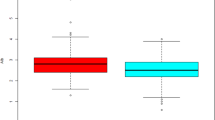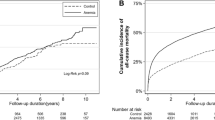Abstract
Objective
To evaluate the prognostic value of hemoglobin levels in critically ill patients with acute renal failure (ARF) requiring dialysis.
Design and setting
A prospective observational cohort study in two adult medical ICUs.
Patients
206 consecutive patients with ARF who required dialysis. Overall 28-day mortality was 48%.
Measurements and results
At ICU admission mean hemoglobin level was 9.1±2.1 g/dl. By ROC curve analysis the threshold value of hemoglobin with the highest sensibility/specificity was 9 g/dl. At baseline 63% of patients had anemia, defined as initial hemoglobin below 9 g/dl. Kaplan-Meier analysis showed that these patients had lower survival rate than those with hemoglobin above 9 g/dl. By multivariable analysis three factors were independently associated with 28-day death: hemoglobin lower than 9 g/dl (adjusted odds ratio 2.4, 95% CI 1.1–5.2), age, and SOFA score. Based on age and SOFA a matched cohort analysis of 67 pairs of ARF patients with or without anemia found similar results regarding the negative impact of anemia on outcome. Finally, a multivariable logistic regression analysis on matched cohort identified hemoglobin level below 9 g/dl (adjusted odds ratio 1.32, 95%CI 1.15–1.46), continuous renal replacement therapy, and vasoactive therapy as independent predictors of 28-day death.
Conclusions
These results suggest that initial hemoglobin level could be helpful in identifying patients with ARF requiring dialysis at high risk of death.



Similar content being viewed by others
References
Thadhani R, Pascual M, Bonventre JV (1996) Acute renal failure. N Engl J Med 334:1448–1460
Singri N, Ahya SN, Levin ML (2003) Acute renal failure. JAMA 289:747–751
Schortgen F, Soubrier N, Delclaux C, Thuong M, Girou E, Brun-Buisson C, Lemaire F, Brochard L (2000) Hemodynamic tolerance of intermittent hemodialysis in critically ill patients: usefulness of practice guidelines. Am J Respir Crit Care Med 162:197–202
Levy EM, Viscoli CM, Horwitz RI (1996) The effect of acute renal failure on mortality. A cohort analysis. JAMA 275:1489–1494
Metnitz PG, Krenn CG, Steltzer H, Lang T, Ploder J, Lenz K, Le Gall JR, Druml W (2002) Effect of acute renal failure requiring renal replacement therapy on outcome in critically ill patients. Crit Care Med 30:2051–2058
Rodriguez RM, Corwin HL, Gettinger A, Corwin MJ, Gubler D, Pearl RG (2001) Nutritional deficiencies and blunted erythropoietin response as causes of the anemia of critical illness. J Crit Care 16:36–41
Vincent JL, Baron JF, Reinhart K, Gattinoni L, Thijs L, Webb A, Meier-Hellmann A, Nollet G, Peres-Bota D (2002) Anemia and blood transfusion in critically ill patients. JAMA 288:1499–1507
Corwin HL, Gettinger A, Pearl RG, Fink MP, Levy MM, Abraham E, MacIntyre NR, Shabot MM, Duh MS, Shapiro MJ (2004) The CRIT Study: anemia and blood transfusion in the critically ill-current clinical practice in the United States. Crit Care Med 32:39–52
Hales M, Solez K, Kjellstrand C (1994) The anemia of acute renal failure: association with oliguria and elevated blood urea. Ren Fail 16:125–131
Nielsen OJ, Thaysen JH (1989) Erythropoietin deficiency in acute renal failure. Lancet I:624–625
Lipkin GW, Kendall R, Haggett P, Turney JH, Brownjohn AM (1989) Erythropoietin in acute renal failure. Lancet I:1029
Iperen CE van, Gaillard CA, Kraaijenhagen RJ, Braam BG, Marx JJ, van de Wiel A (2000) Response of erythropoiesis and iron metabolism to recombinant human erythropoietin in intensive care unit patients. Crit Care Med 28:2773–2778
Hobisch-Hagen P, Wiedermann F, Mayr A, Fries D, Jelkmann W, Fuchs D, Hasibeder W, Mutz N, Klingler A, Schobersberger W (2001) Blunted erythropoietic response to anemia in multiply traumatized patients. Crit Care Med 29:743–747
Elliot JM, Virankabutra T, Jones S, Tanudsintum S, Lipkin G, Todd S, Bion J (2003) Erythropoietin mimics the acute phase response in critical illness. Crit Care 7:R35–R40
Brezis M, Rosen S (1995) Hypoxia of the renal medulla-its implications for disease. N Engl J Med 332:647–655
Murray P, Hall J (2000) Renal replacement therapy for acute renal failure. Am J Respir Crit Care Med 162:777–781
DuBose TD Jr, Warnock DG, Mehta RL, Bonventre JV, Hammerman MR, Molitoris BA, Paller MS, Siegel NJ, Scherbenske J, Striker GE (1997) Acute renal failure in the 21st century: recommendations for management and outcomes assessment. Am J Kidney Dis 29:793–799
Owen WF Jr, Lew NL, Liu Y, Lowrie EG, Lazarus JM (1993) The urea reduction ratio and serum albumin concentration as predictors of mortality in patients undergoing hemodialysis. N Engl J Med 329:1001–1006
Hebert PC, Wells G, Blajchman MA, Marshall J, Martin C, Pagliarello G, Tweeddale M, Schweitzer I, Yetisir E (1999) A multicenter, randomized, controlled clinical trial of transfusion requirements in critical care. Transfusion Requirements in Critical Care Investigators, Canadian Critical Care Trials Group. N Engl J Med 340:409–417
McCabe WR, Jackson GG (1962) Gram negative bacteremia. I. Etiology and ecology. Arch Intern Med 110:847–855
Le Gall JR, Lemeshow S, Saulnier F (1993) A new Simplified Acute Physiology Score (SAPS II) based on a European/North American multicenter study. JAMA 270:2957–2963
Vincent JL, Moreno R, Takala J, Willatts S, De Mendonca A, Bruining H, Reinhart CK, Suter PM, Thijs LG (1996) The SOFA (Sepsis-related Organ Failure Assessment) score to describe organ dysfunction/failure. On behalf of the Working Group on Sepsis-Related Problems of the European Society of Intensive Care Medicine. Intensive Care Med 22:707–710
Hameed SM, Aird WC, Cohn SM (2003) Oxygen delivery. Crit Care Med 31:S658–S667
Members of the task force on Reuse of Dialyzers (1997) National Kidney Foundation report on dialyzer reuse. Council on Dialysis, National Kidney Foundation. Am J Kidney Dis 30:859–871
Nemoto T, Yokota N, Keane WF, Rabb H (2001) Recombinant erythropoietin rapidly treats anemia in ischemic acute renal failure. Kidney Int 59:246–251
Brivet FG, Kleinknecht DJ, Loirat P, Landais PJ (1996) Acute renal failure in intensive care units-causes, outcome, and prognostic factors of hospital mortality; a prospective, multicenter study. French Study Group on Acute Renal Failure. Crit Care Med 24:192–198
Moreno R, Vincent JL, Matos R, Mendonca A, Cantraine F, Thijs L, Takala J, Sprung C, Antonelli M, Bruining H, Willatts S (1999) The use of maximum SOFA score to quantify organ dysfunction/failure in intensive care. Results of a prospective, multicentre study. Working Group on Sepsis Related Problems of the ESICM. Intensive Care Med 25:686–696
Ferreira FL, Bota DP, Bross A, Melot C, Vincent JL (2001) Serial evaluation of the SOFA score to predict outcome in critically ill patients. JAMA 286:1754–1758
Berghe G van den, Wouters P, Weekers F, Verwaest C, Bruyninckx F, Schetz M, Vlasselaers D, Ferdinande P, Lauwers P, Bouillon R (2001) Intensive insulin therapy in the critically ill patients. N Engl J Med 345:1359–1367
Swaminathan M, Phillips-Bute BG, Conlon PJ, Smith PK, Newman MF, Stafford-Smith M (2003) The association of lowest hematocrit during cardiopulmonary bypass with acute renal injury after coronary artery bypass surgery. Ann Thorac Surg 76:784–791
Acknowledgements
We thank Drs. William Marie, Anne Lesage, Abdel Ouchikhe, Michel Ramakers, Virginie Verrier, and Sophie Vincent for their contribution in the management of patients.
Author information
Authors and Affiliations
Corresponding author
Additional information
This article refers to the editorial http://dx.doi.org/10.1007/s00134-005-2738-6
Rights and permissions
About this article
Cite this article
du Cheyron, D., Parienti, JJ., Fekih-Hassen, M. et al. Impact of anemia on outcome in critically ill patients with severe acute renal failure. Intensive Care Med 31, 1529–1536 (2005). https://doi.org/10.1007/s00134-005-2739-5
Received:
Accepted:
Published:
Issue Date:
DOI: https://doi.org/10.1007/s00134-005-2739-5




